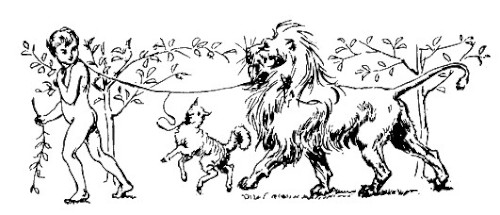 CHAPTER 16 PEACE TO CRANFORD It was not surprising that Mr Peter became such a favourite at Cranford. The ladies vied with each other who should admire him most; and no wonder, for their quiet lives were astonishingly stirred up by the arrival from India — especially as the person arrived told more wonderful stories than Sindbad the Sailor; and, as Miss Pole said, was quite as good as an Arabian Night any evening. For my own part, I had vibrated all my life between Drumble and Cranford, and I thought it was quite possible that all Mr Peter's stories might be true, although wonderful; but when I found that, if we swallowed an anecdote of tolerable magnitude one week, we had the dose considerably increased the next, I began to have my doubts; especially as I noticed that when his sister was present the accounts of Indian life were comparatively tame; not that she knew more than we did, perhaps less. I noticed also that when the rector came to call, Mr Peter talked in a different way about the countries he had been in. But I don't think the ladies in Cranford would have considered him such a wonderful traveller if they had only heard him talk in the quiet way he did to him. They liked him the better, indeed, for being what they called 'so very Oriental.' One day, at a select party in his honour, which Miss Pole gave, and from which, as Mrs Jamieson honoured it with her presence, and had even offered to send Mr Mulliner to wait, Mr and Mrs Hoggins and Mrs Fitz-Adam were necessarily — excluded one day at Miss Pole's, Mr Peter said he was tired of sitting upright against the hard-backed uneasy chairs, and asked if he might not indulge himself in sitting cross-legged. Miss Pole's consent was eagerly given, and down he went with the utmost gravity. But when Miss Pole asked me, in an audible whisper, 'if he did not remind me of the Father of the Faithful?' I could not help thinking of poor Simon Jones, the lame tailor, and while Mrs Jamieson slowly commented on the elegance and convenience of the attitude, I remembered how we had all followed that lady's lead in condemning Mr Hoggins for vulgarity because he simply crossed his legs as he sat still on his chair. Many of Mr Peter's ways of eating were a little strange amongst such ladies as Miss Pole, and Miss Matty, and Mrs Jamieson, especially when I recollected the untasted green peas and two-pronged forks at poor Mr Holbrook's dinner. 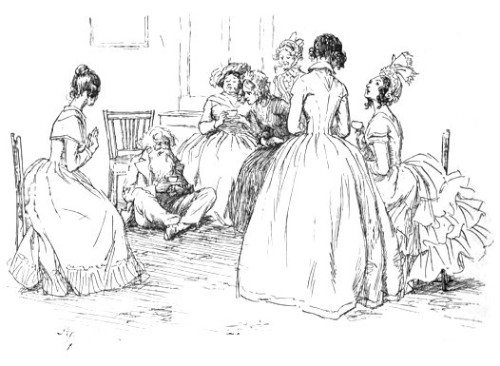 The Father of the Faithful The mention of that gentleman's name recalls to my mind a conversation between Mr Peter and Miss Matty one evening in the summer after he returned to Cranford. The day had been very hot, and Miss Matty had been much oppressed by the weather, in the heat of which her brother revelled. I remember that she had been unable to nurse Martha's baby, which had become her favourite employment of late, and which was as much at home in her arms as in its mother's, as long as it remained a light-weight, portable by one so fragile as Miss Matty. This day to which I refer, Miss Matty had seemed more than usually feeble and languid, and only revived when the sun went down, and her sofa was wheeled to the open window, through which, although it looked into the principal street of Cranford, the fragrant smell of the neighbouring hayfields came in every now and then, borne by the soft breezes that stirred the dull air of the summer twilight, and then died away. The silence of the sultry atmosphere was lost in the murmuring noises which came in from many an open window and door; even the children were abroad in the street, late as it was (between ten and eleven), enjoying the game of play for which they had not had spirits during the heat of the day. It was a source of satisfaction to Miss Matty to see how few candles were lighted, even in the apartments of those houses from which issued the greatest signs of life. Mr Peter, Miss Matty, and I had all been quiet, each with a separate reverie, for some little time, when Mr Peter broke in — 'Do you know, little Matty, I could have sworn you were on the high road to matrimony when I left England that last time! If anybody had told me you would have lived and died an old maid then, I should have laughed in their faces.' Miss Matty made no reply, and I tried in vain to think of some subject which should effectually turn the conversation; but I was very stupid; and before I spoke he went on — 'It was Holbrook, that fine manly fellow who lived at Woodley, that I used to think would carry off my little Matty. You would not think it now, I dare say, Mary; but this sister of mine was once a very pretty girl — at least, I thought so, and so I've a notion did poor Holbrook. What business had he to die before I came home to thank him for all his kindness to a good-for-nothing cub as I was? It was that that made me first think he cared for you; for in all our fishing expeditions it was Matty, Matty, we talked about. Poor Deborah! What a lecture she read me on having asked him home to lunch one day, when she had seen the Arley carriage in the town, and thought that my lady might call. Well, that's long years ago; more than half a life-time, and yet it seems like yesterday! I don't know a fellow I should have liked better as a brother-in-law. You must have played your cards badly, my little Matty, somehow or another — wanted your brother to be a good go-between, eh, little one?' said he, putting out his hand to take hold of hers as she lay on the sofa. 'Why, what's this? you're shivering and shaking, Matty, with that confounded open window. Shut it, Mary, this minute!' I did so, and then stooped down to kiss Miss Matty, and see if she really were chilled. She caught at my hand, and gave it a hard squeeze — but unconsciously, I think — for in a minute or two she spoke to us quite in her usual voice, and smiled our uneasiness away, although she patiently submitted to the prescriptions we enforced of a warm bed and a glass of weak negus. I was to leave Cranford the next day, and before I went I saw that all the effects of the open window had quite vanished. I had superintended most of the alterations necessary in the house and household during the latter weeks of my stay. The shop was once more a parlour: the empty resounding rooms again furnished up to the very garrets. There had been some talk of establishing Martha and Jem in another house, but Miss Matty would not hear of this. Indeed, I never saw her so much roused as when Miss Pole had assumed it to be the most desirable arrangement. As long as Martha would remain with Miss Matty, Miss Matty was only too thankful to have her about her; yes, and Jem too, who was a very pleasant man to have in the house, for she never saw him from week's end to week's end. And as for the probable children, if they would all turn out such little darlings as her god-daughter, Matilda, she should not mind the number, if Martha didn't. Besides, the next was to be called Deborah — a point which Miss Matty had reluctantly yielded to Martha's stubborn determination that her first-born was to be Matilda. So Miss Pole had to lower her colours, and even her voice, as she said to me that, as Mr and Mrs Hearn were still to go on living in the same house with Miss Matty, we had certainly done a wise thing in hiring Martha's niece as an auxiliary. I left Miss Matty and Mr Peter most comfortable and contented; the only subject for regret to the tender heart of the one, and the social friendly nature of the other, being the unfortunate quarrel between Mrs Jamieson and the plebeian Hogginses and their following. In joke, I prophesied one day that this would only last until Mrs Jamieson or Mr Mulliner were ill, in which case they would only be too glad to be friends with Mr Hoggins; but Miss Matty did not like my looking forward to anything like illness in so light a manner, and before the year was out all had come round in a far more satisfactory way. I received two Cranford letters on one auspicious October morning. Both Miss Pole and Miss Matty wrote to ask me to come over and meet the Gordons, who had returned to England alive and well with their two children, now almost grown up. Dear Jessie Brown had kept her old kind nature, although she had changed her name and station; and she wrote to say that she and Major Gordon expected to be in Cranford on the fourteenth, and she hoped and begged to be remembered to Mrs Jamieson (named first, as became her honourable station), Miss Pole and Miss Matty — could she ever forget their kindness to her poor father and sister? — Mrs Forrester, Mr Hoggins (and here again came in an allusion to kindness shown to the dead long ago), his new wife, who as such must allow Mrs Gordon to desire to make her acquaintance, and who was, moreover, an old Scotch friend of her husband's. In short, every one was named, from the rector — who had been appointed to Cranford in the interim between Captain Brown's death and Miss Jessie's marriage, and was now associated with the latter event — down to Miss Betty Barker. All were asked to the luncheon; all except Mrs Fitz-Adam, who had come to live in Cranford since Miss Jessie Brown's days, and whom I found rather moping on account of the omission. People wondered at Miss Betty Barker's being included in the honourable list; but, then, as Miss Pole said, we must remember the disregard of the genteel proprieties of life in which the poor captain had educated his girls, and for his sake we swallowed our pride. Indeed, Mrs Jamieson rather took it as a compliment, as putting Miss Betty (formerly her maid) on a level with 'those Hogginses.' But when I arrived in Cranford, nothing was as yet ascertained of Mrs Jamieson's own intentions; would the honourable lady go, or would she not? Mr Peter declared that she should and she would; Miss Pole shook her head and desponded. But Mr Peter was a man of resources. In the first place, he persuaded Miss Matty to write to Mrs Gordon, and to tell her of Mrs Fitz-Adam's existence, and to beg that one so kind, and cordial, and generous, might be included in the pleasant invitation. An answer came back by return of post, with a pretty little note for Mrs Fitz-Adam, and a request that Miss Matty would deliver it herself and explain the previous omission. Mrs Fitz-Adam was as pleased as could be, and thanked Miss Matty over and over again. Mr Peter had said, 'Leave Mrs Jamieson to me;' so we did; especially as we knew nothing that we could do to alter her determination if once formed. I did not know, nor did Miss Matty, how things were going on, until Miss Pole asked me, just the day before Mrs Gordon came, if I thought there was anything between Mr Peter and Mrs Jamieson in the matrimonial line, for that Mrs Jamieson was really going to the lunch at the 'George.' She had sent Mr Mulliner down to desire that there might be a footstool put to the warmest seat in the room, as she meant to come, and knew that their chairs were very high. Miss Pole had picked this piece of news up, and from it she conjectured all sorts of things, and bemoaned yet more. 'If Peter should marry, what would become of poor dear Miss Matty? And Mrs Jamieson, of all people!' Miss Pole seemed to think there were other ladies in Cranford who would have done more credit to his choice, and I think she must have had someone who was unmarried in her head, for she kept saying, 'It was so wanting in delicacy in a widow to think of such a thing.' 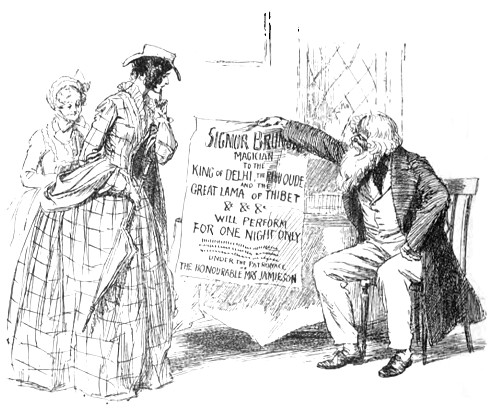 The proof sheet of a great placard When I got back to Miss Matty's I really did begin to think that Mr Peter might be thinking of Mrs Jamieson for a wife, and I was as unhappy as Miss Pole about it. He had the proof sheet of a great placard in his hand. 'Signor Brunoni, Magician to the King of Delhi, the Rajah of Oude, and the great Lama of Thibet,' &c. &c., was going to 'perform in Cranford for one night only,' the very next night; and Miss Matty, exultant, showed me a letter from the Gordons, promising to remain over this gaiety, which Miss Matty said was entirely Peter's doing. He had written to ask the signor to come, and was to be at all the expenses of the affair. Tickets were to be sent gratis to as many as the room would hold. In short, Miss Matty was charmed with the plan, and said that to-morrow Cranford would remind her of the Preston Guild, to which she had been in her youth — a luncheon at the 'George,' with the dear Gordons, and the signor in the Assembly Room in the evening. But I — I looked only at the fatal words: —
So, angry and irritated, and exaggerating every little incident which could add to my irritation, I went on till we were all assembled in the great parlour at the 'George.' Major and Mrs Gordon and pretty Flora and Mr Ludovic were all as bright and handsome and friendly as could be; but I could hardly attend to them for watching Mr Peter, and I saw that Miss Pole was equally busy. I had never seen Mrs Jamieson so roused and animated before; her face looked full of interest in what Mr Peter was saying. I drew near to listen. My relief was great when I caught that his words were not words of love, but that, for all his grave face, he was at his old tricks. He was telling her of his travels in India, and describing the wonderful height of the Himalaya mountains: one touch after another added to their size, and each exceeded the former in absurdity; but Mrs Jamieson really enjoyed all in perfect good faith. I suppose she required strong stimulants to excite her to come out of her apathy. Mr Peter wound up his account by saying that, of course, at that altitude there were none of the animals to be found that existed in the lower regions; the game, — everything was different. Firing one day at some flying creature, he was very much dismayed when it fell, to find that he had shot a cherubim! Mr Peter caught my eye at this moment, and gave me such a funny twinkle, that I felt sure he had no thoughts of Mrs Jamieson as a wife from that time. She looked uncomfortably amazed — 'But, Mr Peter, shooting a cherubim — don't you think — I am afraid that was sacrilege!' 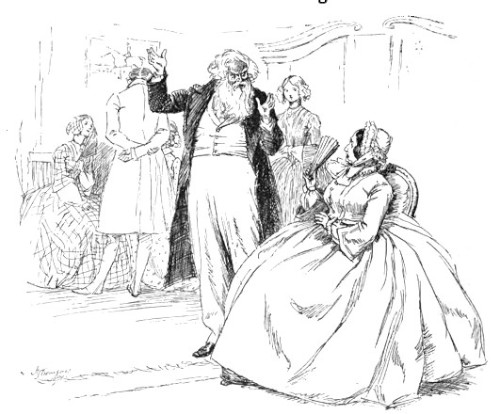 He had shot a cherubim! Mr Peter composed his countenance in a moment, and appeared shocked at the idea, which, as he said truly enough, was now presented to him for the first time; but then Mrs Jamieson must remember that he had been living for a long time among savages — all of whom were heathens — some of them, he was afraid, were downright Dissenters. Then, seeing Miss Matty draw near, he hastily changed the conversation, and after a little while, turning to me, he said, 'Don't be shocked, prim little Mary, at all my wonderful stories. I consider Mrs Jamieson fair game, and besides I am bent on propitiating her, and the first step towards it is keeping her well awake. I bribed her here by asking her to let me have her name as patroness for my poor conjuror this evening; and I don't want to give her time enough to get up her rancour against the Hogginses, who are just coming in. I want everybody to be friends, for it harasses Matty so much to hear of these quarrels. I shall go at it again by-and-by, so you need not look shocked. I intend to enter the Assembly Room to-night with Mrs Jamieson on one side, and my lady, Mrs Hoggins, on the other. You see if I don't.' Somehow or another he did; and fairly got them into conversation together. Major and Mrs Gordon helped at the good work with their perfect ignorance of any existing coolness between any of the inhabitants of Cranford. Ever since that day there has been the old friendly sociability in Cranford society; which I am thankful for, because of my dear Miss Matty's love of peace and kindliness. We all love Miss Matty, and I somehow think we are all of us better when she is near us. 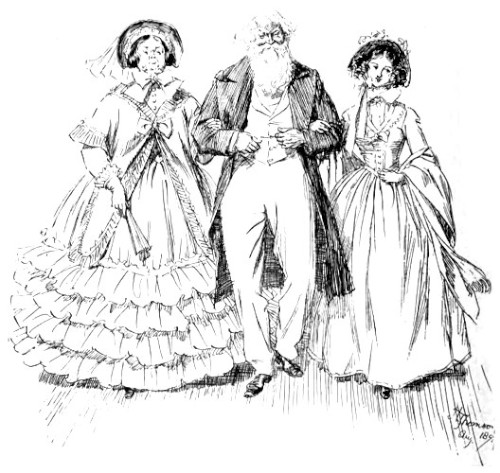 Mrs. Jamieson on one side, and my lady, Mrs. Hoggins, on the other |
Web and Book design,
Copyright, Kellscraft Studio
1999-2010
(Return to Web Text-ures)
